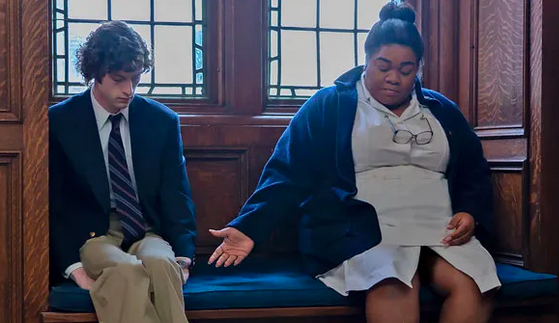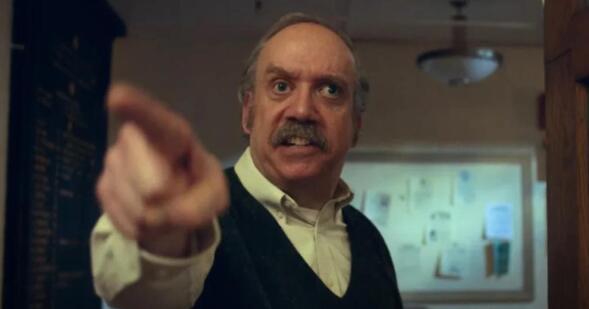Due to demand, "The Holdovers" is holding over for March!
"Glorifying the Fib"
ToNT.oRg
Feb '24
Spiritual review of
"The Holdovers"
***SPOILER ALERT*** ~t.
"The Holdovers" is a film reminding us that while "reasons are secondary, the fact remains," intentions are far more informative and human compassion far more important. In youth there's a period where fairness is innately understood, where children are generally inclined towards goodness and, if not encouraged, those natural inclinations can be sublimated by mimicking those around them often resulting in a devastatingly typical "lord of the flies" themed situation.
This story is about the opposite: It's about people who haven't yet surrendered to legalism or entropy; who still have within them bravery, kindness, decency, independence of thought and ultimately: the courage to act from this place (by also constantly fibbing along the way). When confronted with revealing intimate information about one another they can be trusted with it. Both understand the lies being told are to save a position or protect someone from cruelty, or even for practicality; and the film is mature enough to show that those lacking reason, adhering to legalism for legalism's sake, cause far more damage than safety or convenience measures of decent people ever could.
It's Christmas break at a prestigious boarding school and while kids are off on their respective holidays, remaining at the school are those unable to make outside arrangements, for whatever reason, until finally we're left with one student, one teacher assigned baby-sitting duty, along with a wise and broken-hearted cook and her would be suitor, also the janitor. While starting out somewhat bitter and unhappy, these characters little by little nudge the humanity out of one another (wonderful because they respond to the nudging) with cook matriarch slapping sense into the heretofore helplessly obtuse, proving to be a preternaturally effective catalyst and, suddenly, we're on a "field trip" to Boston (Aurelius' Meditations left behind for another time).
The sarcastic and despotic history professor (see grade of F+), with seemingly bottomless disdain for his "philistinic" students, begins to soften up and see his ward less as "burden" and more as "real kid", with feelings, a kid who's worthy of more consideration as we've been privy to demonstrations of his compassion as well as his logical, almost uncannily innocent, appeals to reason. He's capable of being a truly good person, and often is. It's these qualities which jar forth more moments of humanity from our professor until he finally aids the young man in what may be the pivotal event of his life - only to find that moment is yet to come.
The journey back to school is a contented, if subdued, one. A bond has developed of mutual understanding and respect; and how could this not provide some succor and satisfaction? Reality exhales for a moment, having expanded for a lifetime on their trip, with beneficent effects still to be lived to be revealed. No time for slow rumination, however - circumstances convene making their exquisite, generously human excursion but a turnpike - and now someone must pay. The parents of our student protagonist (who have been vacationing in St. Kitts) get wind of the Boston trip they did not authorize and it is THIS defiance that brings them to the school at last. The opportunity to punish requires no commitment or planning: Indignance is more than enough to get someone to act too quickly and extremely.
First the professor is called into the headmaster's office where an explanation is DEMANDED. Just tell us, they say, did he convince you to go, did he "slip the leash" somehow? Just let us know, they cajole, so we may have our excuse to execute the punishment we cut our vacation short to come and do! We KNOW he's guilty - THAT BOY MUST BE PUNISHED. Well, slow your roll, folks! Our elder protagonist will have none of it. He refuses to capitulate valiantly jujutsuing instead: The grumbling dead-end, much-detested professor, with so much more against him than we knew, calls out these wealthy self-righteous parents for being negligent; for selfishly not answering the phone! so, as de facto adult-in-charge, he made a decision - the caring decision - the RIGHT decision to allow "that boy" to see his sick father for the holidays!
The professor insists HE orchestrated the outing, contentious visit under his sanction; thus (now all in for the big gambit - alea iacta est!), "Why punish the child further (mother and step-father)?" Why add more pain to his life by forcing him into military school? He asserts the teen is smart, really smart, could possibly be brilliant, even. Why not let him stay? Noble device successfully deployed - acumen & aplomb you're up(!) - and the verdict swings soberly to reason. Show over (self-interest agape in the wings), not but "a Barton man" but - his own man - he stands by his choice. He stands by his lie. Once, a compassionate and caring teacher did the same for him. He is fired for it.
Did you ever feel truly understood by an adult - any adult - when you were a child? If so, it's likely one of your most precious memories, for, to be understood by anyone is a gift and rarity in this world. As our hero professor walks out of the office, he turns and nods to the frightened boy (cook there to comfort him hand-in-hand) who has yet to know his fate. The film then cuts to scenes of soon-to-be peripatetic professor packing remnants of what now is a former life, a life built on a compassionate lie, but, a life also fueled by the anger over the unfairness of the necessity of that lie. It is time to let it go now, but, where will he go?
U-haul loaded up in tow, our student sees in the distance his friend getting ready to leave. He runs over to the car to say his good-byes. As they shake hands we see two people who have indelibly changed one another's lives; who left not just handprints, but, actual moldings upon one another forever augmenting the machinery of how they once functioned, jumpstarting the better people they'll inevitably become. So much more love and comprehension is exhibited by the elder, this is as it should be. The younger runs off, back to school, somewhat aware of the incredible sacrifice made for him but, being young, undoubtedly will need years (more likely decades) to truly comprehend.
As Paul Giamatti's professor drives towards the road at the exit of the school grounds, he stalls. He opens the very expensive bottle of liquor awarded him for being this year's designated baby-sitter. Pouring a big gulp into his mouth, he looks both ways down the road, which way to go? He rolls down the window and spits out the alcohol. Finally freed from lies defining his path, the crutches required to hobble along it fly out the window, too. He realizes it doesn't matter which way he goes... he knows it will be good. Maybe for the first time in his life. For, it was a far far greater thing he did than he has ever done, therefore; far far greater things will he do still and have yet to be done. That'll do professor, that'll do.
"The Holdovers"
***SPOILER ALERT*** ~t.
"The Holdovers" is a film reminding us that while "reasons are secondary, the fact remains," intentions are far more informative and human compassion far more important. In youth there's a period where fairness is innately understood, where children are generally inclined towards goodness and, if not encouraged, those natural inclinations can be sublimated by mimicking those around them often resulting in a devastatingly typical "lord of the flies" themed situation.
This story is about the opposite: It's about people who haven't yet surrendered to legalism or entropy; who still have within them bravery, kindness, decency, independence of thought and ultimately: the courage to act from this place (by also constantly fibbing along the way). When confronted with revealing intimate information about one another they can be trusted with it. Both understand the lies being told are to save a position or protect someone from cruelty, or even for practicality; and the film is mature enough to show that those lacking reason, adhering to legalism for legalism's sake, cause far more damage than safety or convenience measures of decent people ever could.
It's Christmas break at a prestigious boarding school and while kids are off on their respective holidays, remaining at the school are those unable to make outside arrangements, for whatever reason, until finally we're left with one student, one teacher assigned baby-sitting duty, along with a wise and broken-hearted cook and her would be suitor, also the janitor. While starting out somewhat bitter and unhappy, these characters little by little nudge the humanity out of one another (wonderful because they respond to the nudging) with cook matriarch slapping sense into the heretofore helplessly obtuse, proving to be a preternaturally effective catalyst and, suddenly, we're on a "field trip" to Boston (Aurelius' Meditations left behind for another time).
The sarcastic and despotic history professor (see grade of F+), with seemingly bottomless disdain for his "philistinic" students, begins to soften up and see his ward less as "burden" and more as "real kid", with feelings, a kid who's worthy of more consideration as we've been privy to demonstrations of his compassion as well as his logical, almost uncannily innocent, appeals to reason. He's capable of being a truly good person, and often is. It's these qualities which jar forth more moments of humanity from our professor until he finally aids the young man in what may be the pivotal event of his life - only to find that moment is yet to come.
The journey back to school is a contented, if subdued, one. A bond has developed of mutual understanding and respect; and how could this not provide some succor and satisfaction? Reality exhales for a moment, having expanded for a lifetime on their trip, with beneficent effects still to be lived to be revealed. No time for slow rumination, however - circumstances convene making their exquisite, generously human excursion but a turnpike - and now someone must pay. The parents of our student protagonist (who have been vacationing in St. Kitts) get wind of the Boston trip they did not authorize and it is THIS defiance that brings them to the school at last. The opportunity to punish requires no commitment or planning: Indignance is more than enough to get someone to act too quickly and extremely.
First the professor is called into the headmaster's office where an explanation is DEMANDED. Just tell us, they say, did he convince you to go, did he "slip the leash" somehow? Just let us know, they cajole, so we may have our excuse to execute the punishment we cut our vacation short to come and do! We KNOW he's guilty - THAT BOY MUST BE PUNISHED. Well, slow your roll, folks! Our elder protagonist will have none of it. He refuses to capitulate valiantly jujutsuing instead: The grumbling dead-end, much-detested professor, with so much more against him than we knew, calls out these wealthy self-righteous parents for being negligent; for selfishly not answering the phone! so, as de facto adult-in-charge, he made a decision - the caring decision - the RIGHT decision to allow "that boy" to see his sick father for the holidays!
The professor insists HE orchestrated the outing, contentious visit under his sanction; thus (now all in for the big gambit - alea iacta est!), "Why punish the child further (mother and step-father)?" Why add more pain to his life by forcing him into military school? He asserts the teen is smart, really smart, could possibly be brilliant, even. Why not let him stay? Noble device successfully deployed - acumen & aplomb you're up(!) - and the verdict swings soberly to reason. Show over (self-interest agape in the wings), not but "a Barton man" but - his own man - he stands by his choice. He stands by his lie. Once, a compassionate and caring teacher did the same for him. He is fired for it.
Did you ever feel truly understood by an adult - any adult - when you were a child? If so, it's likely one of your most precious memories, for, to be understood by anyone is a gift and rarity in this world. As our hero professor walks out of the office, he turns and nods to the frightened boy (cook there to comfort him hand-in-hand) who has yet to know his fate. The film then cuts to scenes of soon-to-be peripatetic professor packing remnants of what now is a former life, a life built on a compassionate lie, but, a life also fueled by the anger over the unfairness of the necessity of that lie. It is time to let it go now, but, where will he go?
U-haul loaded up in tow, our student sees in the distance his friend getting ready to leave. He runs over to the car to say his good-byes. As they shake hands we see two people who have indelibly changed one another's lives; who left not just handprints, but, actual moldings upon one another forever augmenting the machinery of how they once functioned, jumpstarting the better people they'll inevitably become. So much more love and comprehension is exhibited by the elder, this is as it should be. The younger runs off, back to school, somewhat aware of the incredible sacrifice made for him but, being young, undoubtedly will need years (more likely decades) to truly comprehend.
As Paul Giamatti's professor drives towards the road at the exit of the school grounds, he stalls. He opens the very expensive bottle of liquor awarded him for being this year's designated baby-sitter. Pouring a big gulp into his mouth, he looks both ways down the road, which way to go? He rolls down the window and spits out the alcohol. Finally freed from lies defining his path, the crutches required to hobble along it fly out the window, too. He realizes it doesn't matter which way he goes... he knows it will be good. Maybe for the first time in his life. For, it was a far far greater thing he did than he has ever done, therefore; far far greater things will he do still and have yet to be done. That'll do professor, that'll do.
How fitting to have some Cat Stevens along for the ride! A film as quirky, meaningful and profound as "Harold and Maude", "The Holdovers" is just as deserving of Stevens' magical, child-like melody and rich mellifluous tone.
...And his new path shall be blessed by "sublime winds" as was his heroic act - crackling through humanity, palpable as a lightning strike - a quickening claiming victory forever remaining in the annals of history. Seen or unseen the record stands: It is a win for all of us. First, by "listening to the wind of his soul," sublime winds will now carry him on high to fly among angels...
LISTEN. BE LED. LET SPIRIT CARRY YOU FURTHER IN CELEBRATION.







